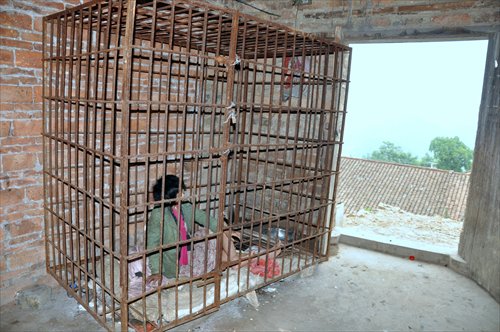Mentally ill confined at home due to lack of resources and public education
Hundreds of thousands of mentally ill people are shackled or locked in cages at home because their families can't cope with their behavior. Recently, officials have started programs to help educate villagers about severe mental illness and provide care, but even when treatment proves effective and free medicine is provided, the mentally ill patients often end up back in their cages after they return home.

Cheng Xiangtao, 26, mentally ill and born blind, is shackled in a cave away from his home by his father in a village in Luoyang, Henan Province. Photo: CFP
Wu Xiu, 44, is caged by her husband at home to stop her from attacking people in a village in Ruichang, Jiangxi Province. Photo: IC
For days, local residents of the town of Tangxia in Dongguan, Guangdong Province, often saw a naked woman locked in a cage on a sidewalk.
The cage was covered by iron sheets on three sides and a wooden board on the top to block the rain. A door on the side of the cage was usually locked.
The woman in the cage often tore at her clothes because of the hot weather, so now her family left her naked. Sometimes she starts to yell.
The woman, surnamed Song, has a mental illness. Her family couldn't pay for her long-term expenses at the hospital and had to keep her at home, locked in a cage because they have no other way of taking care of her.
This type of incident is not without precedence. Media have reported many with mental illness were locked in cages by their families because they can't pay or don't have time to care for the patients.
Right now in China, each province has its own benefits for those patients. There are different kinds of treatment and medicine that are covered by medical insurance. But the situation is still dire because the number of patients greatly exceeds the number of medical workers.
Sometimes the families don't even want to care for the patients because they know little of the illness, and have not been educated on how to deal with it.

No other way
Song's mother Guan told Southern Metropolis Daily that Song has been mentally ill for 16 years.
Song first became ill at 17, when she graduated from high school and was looking for a job.
Her parents took her to the hospital and she got better. She got married when she was 26, but afterwards she stopped taking medication and soon became ill again.
Song got divorced three years ago. Her parents then moved to Dongguan with her.
When Song gets ill, she always yells, both night and day. Sometimes she rips her clothes open. In the past few years, the family has been kicked out of their apartments more than 20 times because of neighbors' complaints.
The most recent time the family was thrown out was on May 4. Guan remembers that they had to sleep under a bridge. "We were lucky it was summer," Guan said.
She had no idea what else she could do. So she locked her daughter in a cage, only opening the door for meals. Guan delivers the food to her daughter and delivers bathing water in buckets as well.
Many people are like Song, locked in their own homes. According to a 2013 report on The Beijing News, more than 100,000 people in Hebei Province alone were locked by chains or in cages.
Liu Yuegui, a resident in Shenjing village in Hebei, has lived in a cage for more than 10 years. In 1983, he got into a fight at work. Then he started behaving strangely and often muttered that some people want to kill him, the man's brother Liu Yuefu told The Beijing News.
His family took him to a doctor, who prescribed some medicine. But his illness never got better. He was often seen shouting from rooftops and grabbing women's feet in cotton fields. In 2002, he hacked a villager to death with a sickle.
That incident shocked the village. Everybody was afraid of Liu Yuegui, and urged his family to do something. In order to keep him out of trouble, Liu's family made an iron cage and put him inside.
Freedom project
The Center for Disease Control and Prevention released a report in 2009 saying there are more than 16 million people in China with severe mental diseases.
According to China's Criminal Law, people with mental illness should be committed to an institution if they are severely violent and threaten public safety. Others can go to the hospital only on a voluntary basis.
Many of the 16 million choose not to go to the hospital. Some families feel ashamed of the patients and refuse to visit doctors.
Another issue is the lack of medical professionals. Right now in China, there are only 190,000 registered psychiatrists, not nearly enough for the number of patients.
Of those who do go to hospitals, many families couldn't pay for treatments, or have no energy to take care of them as they recover, so they lock them in cages.
Guan knows that if she takes her daughter to the hospital, her daughter will get better.
"If she keeps taking medicine, she won't be ill anymore," she told Southern Metropolis Daily.
But right now, the family of seven lives in two apartments and all depend on the son's salary. They cannot afford to treat Song, Guan said.
But Guan didn't know there are different free treatment plans in each province. In Dongguan, residents with a local household registration can enjoy free medication. Migrant workers who have local medical insurance can get 70 percent reimbursement. The government also gives a free health check to those with mental illness every year.
On June 15, some locals took photos of the caged Song and posted them online. The photos were forwarded by many netizens. The next day, the town government sent police and medical workers to help her get to a psychiatrist. The authorities have decided to treat her as an exception and offer her free treatment though she is not registered as a local resident.
Starting from May 2008, Hebei started a program called the Unlocking Project. Hospitals in the province provide free treatment to those with severe mental illness in order to free them from cages.
The No.6 People's Hospital in Hebei has already given free treatment to 118 people.
The same free treatment or reimbursement plans can be found in other cities throughout China, but it is still not enough.
Recently, the National Health and Family Planning Commission and nine other bureaus jointly published a five-year plan, which declared that by 2020, over 70 percent of towns will have medical groups monitoring the situation of mentally ill patients, and have recovery services. All severe mental illness patients will also be covered in local government insurance plans.
Back to the cage
After two months of treatment at Hebei's No.6 People's Hospital as part of the Unlocking Project, Liu Yuegui wasn't violent anymore and regained most of his social skills. The hospital decided to send him back home.
But the director from the publicity department in the hospital was surprised to find Liu's house locked when the hospital tried to return him, even though the hospital informed Liu's family earlier they would be coming. When the director called Liu's family on the phone, they said they went away on an emergency matter and couldn't come back.
Then the villagers congregated in front of the ambulance, trying to prevent Liu from returning to the village. "If you want to return him, you'll have to run over all of us," some shouted.
The ambulance then drove to the village police station. A couple of days later, Liu was escorted home by a policeman. But soon, in front of the entire village, he was thrown into a cage again by his family.
Li Keqing, dean of the No.6 People's Hospital, told The Beijing News that the issue in China right now is that many mentally ill patients lack family support and community recovery facilities, which are crucial in their recovery process.
Tian Weilan is another patient in Hebei who went through treatment in the No.6 People's Hospital.
Yan Baoping, a psychiatrist at the hospital, told The Beijing News that after treatment, Tian almost completely recovered. He brought three months' worth of medicine home, but after he finished the medicine, his family never contacted the hospital again for more.
A year later, his illness came back, and his brothers locked him up in a cage once again.
Yan said the family's inaction is the main reason for the illness to return. The medicine Tian takes only costs 5 yuan ($0.85) per bottle. It'll cost the family about 40 yuan a month to keep Tian sane. These hospitals can also provide free medicine if contacted, but Tian's brothers didn't bother.
One of his brothers said they took turns feeding Tian medicine, but he didn't want to take it, so they gave up.
From June to July 2012, the hospital revisited 100 former patients, Yan told The Beijing News. About one third had recovered to their previous state of mind and could even work in the fields. One third could control their violent actions and could take care of their daily lives. But the final third relapsed and were either locked up again, dead, or missing.
There are no proper community recovery facilities in China. In 2011, a center was established in cooperation with Italian medical services in Haidian district in Beijing for mentally ill patients to recover. They live together with volunteers and cook, shop and live just like healthy people.
But such facilities have not been granted approval from the government. Medical workers and administrators say this model needs to be explored.
For now, China's situation for the mentally ill is not looking bright.
Liu Yuegui's brothers have no idea why the hospital and media are making a fuss about them locking up Liu in a cage.
"What else can we do?" they asked repeatedly.
Newspaper headline: Shackled in ignorance